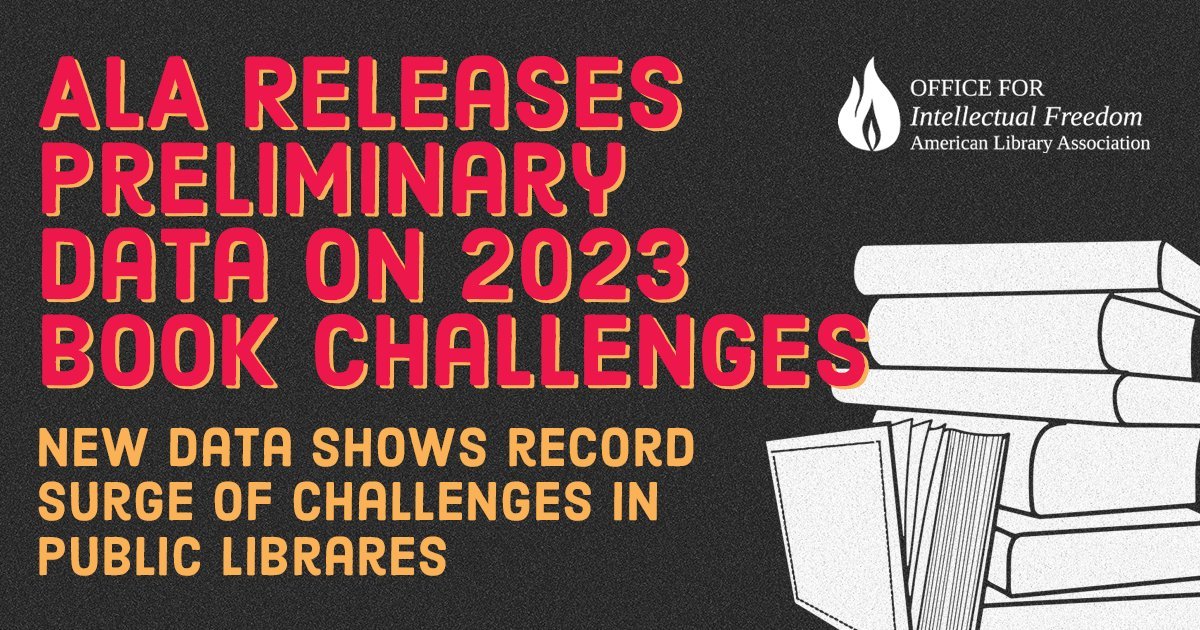On September 20, the American Library Association (ALA) released new preliminary data that documents the continued rise in attempts to censor books and materials in public, school, and academic libraries during the first eight months in 2023.
The data shows that, between January 1 and August 31, 2023, ALA’s Office for Intellectual Freedom (OIF) reported 695 attempts to censor library materials and services and documented challenges to 1,915 unique titles. The number of unique titles challenged has increased by 20% from the same reporting period in 2022, the year in which the highest number of book challenges occurred since ALA began compiling this data more than 20 years ago. Most of the challenges were to books written by or about a person of color or a member of the LGBTQIA+ community.
Challenges to books in public libraries accounted for 49% of those OIF documented, compared to 16% during the same reporting period in 2022. The largest contributor to the rise in both the number of censorship attempts and the increase in titles challenged continues to be a single challenge by a person or group demanding the removal or restriction of multiple titles.
“These attacks on our freedom to read should trouble every person who values liberty and our constitutional rights,” said Deborah Caldwell-Stone, OIF director. “To allow a group of people or any individual, no matter how powerful or loud, to become the decision-maker about what books we can read or whether libraries exist, is to place all of our rights and liberties in jeopardy.”
Caldwell-Stone continued: “Expanding beyond their well-organized attempts to sanitize school libraries, groups with a political agenda have turned their crusade to public libraries, the very embodiment of the First Amendment in our society. This places politics over the well-being and education of young people and everyone’s right to access and use the public library.”
“What this data set does not reveal are the people who want books that speak to their lived experience and librarians who want to make books accessible to people who find them relevant. Both are under attack,” said ALA President Emily Drabinski.
“The antidote to the contagion of censorship is public, vocal support for libraries,” said Drabinski. “Libraries continue to welcome every reader in their communities and provide something in the collection for everyone. ALA invites everyone who cares about protecting the freedom to read to show up to support their libraries at a local school or library board meeting, participate in Banned Books Week initiatives in October, and join the Unite Against Book Bans campaign to fight censorship.”
Banned Books Week 2023, observed October 1-7, will draw attention to attempts to remove books and other materials from libraries, schools, and bookstores. The 2023 Banned Books Week theme, “Let Freedom Read,” is a call to action that underscores the urgent need to defend the right to read and to support the community of readers, library staff, educators, authors, publishers and booksellers. Beloved reading advocate, writer, and television and film star LeVar Burton will lead this year’s Banned Books Week. He is the first actor to serve as honorary chair.
“Books bring us together. They teach us about the world and each other. The ability to read and access books is a fundamental right and a necessity for life-long success,” Burton said in a September 20 statement. “But books are under attack. They’re being removed from libraries and schools. Shelves have been emptied because of a small number of people and their misguided efforts toward censorship. Public advocacy campaigns like Banned Books Week are essential to helping people understand the scope of book censorship and what they can do to fight it.”
Read the full statement from ALA, along with examples of publicly documented cases of censorship.
For more information about ALA and its intellectual freedom efforts, visit www.ala.org.


